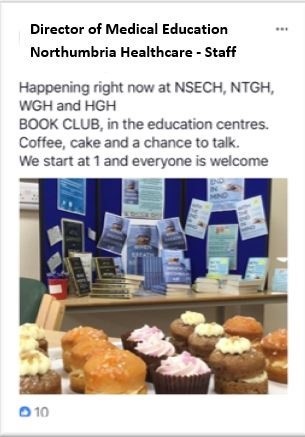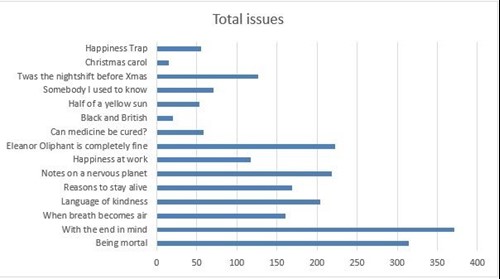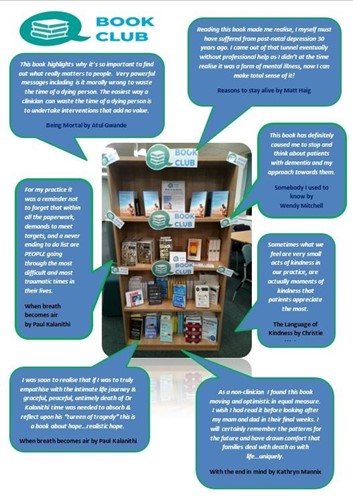We have had a non-medical book collection for many years because we think that reading is good for healthcare professionals and students – it reduces stress and improves thinking and communication skills all of which can have a positive effect on the way people go about their work.
In December 2018 we had discussions with some of our medical directors and the Trust’s Public Health Consultant about how the Library could support the Trust’s key objective of Realistic Medicine by encouraging reflection and debate. New initiatives in Public Health have raised the profile of Realistic Medicine, encouraging informed decision making in healthcare and emphasising the importance of communication and empathy from healthcare professionals. This was the catalyst to start our Book Club.
We got funding for a year and launched the Book Club at the February 2019 Grand Round meeting which was a Death Cafe. We chose Being Mortal as the first Book of the month as we thought it would encourage further reading and debate about death and dying. The first three titles emerged from discussions with senior members of staff/Medical directors, all of which were written by doctors and focused on death and dying. We chose further titles to broaden the subject area and increase participation from other staff groups.
We asked readers to comment on the books and this approach gathered momentum from both an educational and changing culture perspective. We overcame initial reservations from readers around writing comments in library books by providing comments cards and encouraged discussion on the Staff Facebook and Library Twitter page. We also held a monthly prize draw for everyone who commented on Book Club titles.
We promoted the Book Club with lunchtime book stalls, at nursing conferences and by putting up displays in all four of our libraries and we were encouraged to take the Book of the Month to Trust-wide Grand Round meetings. Exploiting outreach opportunities provided increased visibility and raised the profile of the library service.

We are continuously evaluating the book club. When we talked to staff and students at a Knowledge Café, we asked three questions for a mid-year review of the project:
- How do we engage junior doctors and med students with book club?
- How do we get everyone to write comments in books/Facebook and twitter?
- How can we share the comments and learning?
Everyone was encouraged to draw, doodle and write their ideas on paper tablecloths. We received some great responses and everyone enjoyed having the opportunity to talk about books and films. This feedback was collated and we continue to act upon the suggestions gathered at this session.
Analysis of the issue statistics demonstrate that the Book club titles have encouraged more people to join the library and borrow books and anecdotal evidence suggests that we are attracting a much wider range of staff and students. Taking the Book club to Trust inductions allows us to sign up people on their first day and to communicate our message that reading is good for you.

This chart shows the total number of issues for each title February 2019 – January 2020. As we continue to display and promote all the books of the month, the earlier ones have the highest number of issues. Our March book of the month, With the end in mind by local author Kathryn Mannix is our most popular book so far, having peaked again in November when she spoke at our Dynamic Nursing Conference. The 3 books that have been most successful while they are book of the month are Twas the nightshift before Christmas (70 in December), Eleanor Oliphant is completely fine (67 issues in August) and Language of kindness (62 in May). These have also attracted the most comments on the Northumbria Staff Facebook page. We held a Facebook poll to choose out first fiction book of the month and Eleanor Oliphant was the runaway winner.
Although sharing reflection and learning through encouraging readers to write their comments in the books was a priority from the start, this has decreased over time. So to celebrate the Book club’s first birthday, we are conducting a survey to collect more feedback. We are asking people to describe the personal or professional impact of the books they have read. The survey was launched at the 2020 February Grand round meeting. Analysis of the survey results and other feedback will provide a focus to help develop the project as we plan for a second year of Book Club.

Jenny Richardson
Julie Weeks
Northumbria Healthcare NHS Foundation Trust

